Owensboro is a small city in Western Kentucky in the USA. It’s on the banks of the Ohio River and to the other side of the river is the state of Indiana.
Landing off a 30-seater plane you get the feeling that this really is rural America.
It’s all crops on this side of the state. East Kentucky is mainly the Appalachian Mountains.
Although when you arrive you see big industry. Agriculture is very important in the area and Owensboro Grain takes up either side of the roadways in parts of the town.
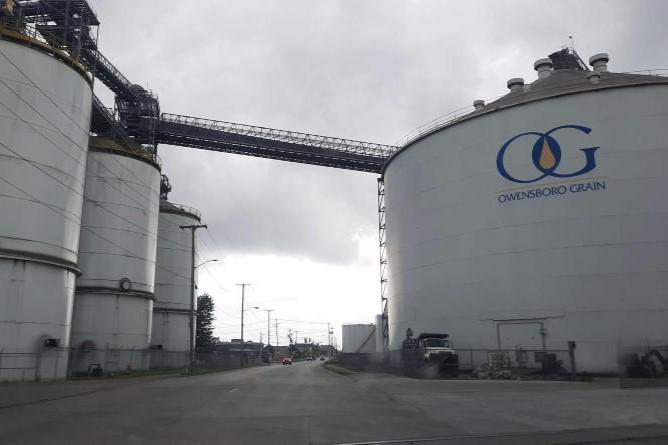
Owensboro Grain tower in Kentucky.
This is a soybean processing and refining facility and in 2023, Cargill took over this family business. There is a bourbon distillery in the city and amazingly large stocks of the World’s aluminium are distributed from here.
Just outside of this town is Philpot. This is home to Rubisco Seeds, a family-owned business of Brian and Claire Caldbeck who moved to the US 20 years ago in 2004 and are now responsible for selling oilseed rape seed to 46 of the 52 states in the United States.
The Irish Farmers Journal visited the Caldbecks at the end of May. There had just been heavy rain and that was evident looking out at flooded fields from the plane as the Ohio River and the Green River made their presence felt.

Sclerotinia on a variety in the trials.
Annual rainfall in Kentucky is about 45”. The Caldbecks plant soybeans and maize on their farm, along with some canola of course which their son Ben was looking after this year.
The whole family, who are trained in engineering and science, is involved in the business and looking to the future with the possibility of developing a crushing facility on their farm.
Moving to the US
Brian worked as an agronomist in Ireland before moving to the US as a consultant. He was a spring barley expert and worked with Minch Norton (Boortmalt now) as they were known at the time.
By 2008, Brian went out on his own and quickly became known for his expertise in oilseed rape or canola as the Americans call it.
Brian worked with farmers and merchants building up the canola area. There was a need for a break crop and a non-GM crop on farms. He quickly realised that the genetics of the rapeseed being grown in the US did not suit the area.
The Caldbecks then started to import European rapeseed varieties to the US. Brian looked for companies with high-yielding crops and tested those varieties in US conditions. The Caldbecks still work with those companies today in their business Rubisco Seeds which is the largest seller of winter canola seed in the US.
Amazingly there is little regulation around seeds in the US compared to Europe, but Brian brought his experience from Ireland into practice and began trialling varieties for three years before bringing them to market.
He would then bring the varieties to the market in small amounts to make sure farmers were happy with their crops. The climate in the US Midwest can be pretty severe some years, so several years of trials are important to gain confidence in performances.
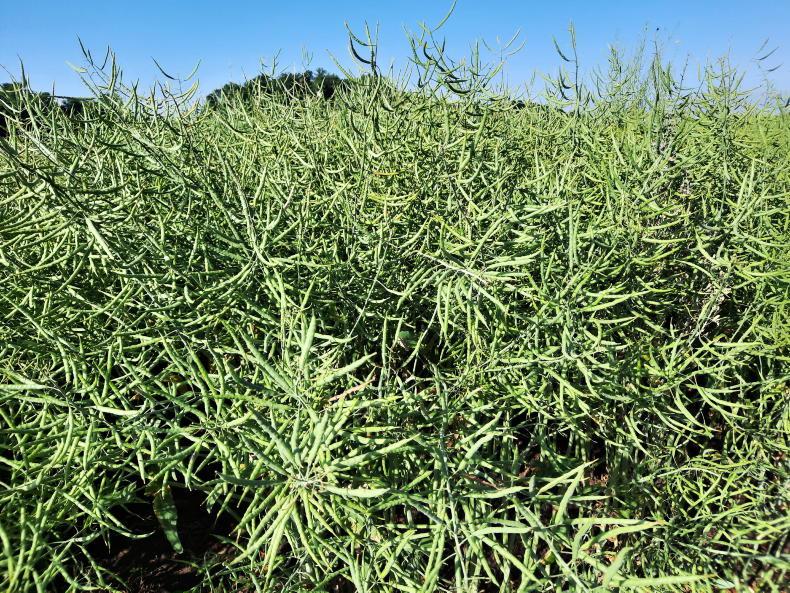
A crop of Beatrix canola.
Claire deals with retailers and quality control of the seed supply and showed the Irish Farmers Journal around the business and one of the trial sites where Rubisco Seeds test their crops. They are trialled privately and in state trials. At Purdue University’s research location in Indiana, we saw some varieties that have been trialled in Ireland on show.
The Caldbecks now have trial sites and field days in different states to educate local farmers about the crop. Brian brought advice on seeding rates, worked with equipment manufacturers to kit out wide row (37”-75”) maize and soybean planting equipment to handle canola seed, developend fertility programmes, and fungicide programmes and worked with federal agencies to get Diquat registered for use before harvest time.
Irish farmers are well used to hearing about pod shatter resistance. This valuable trait has been successfully developed both through conventional breeding and genetic modification. Pod shatter tolerance is the principal reason governing the transition from swathing canola to direct harvesting in North America over the last 10 years.
The varieties Rubisco Seeds supply are conventional, non-GM varieties. In winter canola, non-GM varieties consistently outyield GM varieties by 10 to 25%.
Additionally, not having herbicide tolerant GM canola volunteers, showing up in the following herbicide tolerant GM soy or corn crop is important for US farmers. Non GM canola also typically commands a premium in the market place.
Claire said: “In a lot of crops you’ll see a 10-20% yield advantage in growing conventional crops. But a lot of times farmers will want the Roundup, tolerance just because they think it’s easier to spray that one roundup chemistry.”
However, Claire added that multiple weeds are now becoming resistant to glyphosate. Pigweed, Mare’s tail and different grass weeds are among those becoming difficult to control. Claire explained conventional herbicides can be sprayed on these weeds in the non-GM canola to get them under control in the crop rotation.
The Caldbecks sell spring and winter hybrids depending on the region and climate. Most of the seed they sell however is winter canola. They have to import the seed as it is hard to produce the seed in the US where there is so much GM canola.
There is a risk of cross-contamination and subsequent loss of premiums for farmers. Claire explained that they take that variable out by importing the seed.
Similarities to Ireland
A lot of the varieties that Claire showed in the trials are varieties we have heard of here in Ireland. There were Clearfield varieties to control brassica weeds. Beatrix CL and Phoenix CL are both Clearfield varieties which have been available in Ireland and are in trial with Rubisco Seeds.
One variety showed a huge amount of Sclerotinia infection, a disease that we watch out for in Ireland. Farmers are also using the Green Area Index to manage nitrogen applications, but most fertiliser programmes are based on anticipated yield goals and market prices.
Winter canola is generally planted around September time, but this varies between states. America is a huge country, so while they might plant in September in Kentucky it could be October in Texas. The crop is harvested from June on.
Some of the crops we saw at the end of May were coming near the time for being sprayed off in Indiana, but in states like Washington in the northwest of the country, harvest might not happen until July.
The Pacific North West is becoming a very important market for Rubisco Seeds with a lot of interest in canola in the states of Oregon, Washington, and Idaho where rotations heavy in cereals need a break crop.
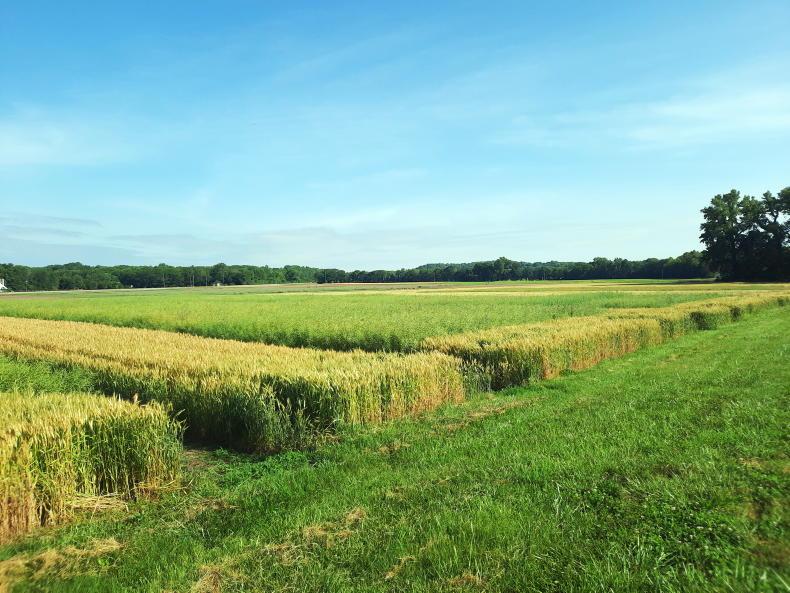
Rubisco Seeds winter canola trials.
Crops planted in the autumn generally don’t receive any nitrogen fertiliser, apart from what is carried in the phosphate applied, as growers don’t want it to get too lush. Some crops may get organic manures such as chicken litter or pig manure. In the springtime nitrogen and sulphur will be applied. Insecticides and fungicides are used based on the crop’s needs.
Along the roads we travelled we saw more direct drilled crops with soybeans planted into maize stubble as can be seen in the picture. Farmers are more and more environmentally conscious and in some cases are being paid to implement more environmentally friendly actions on farms.
Canola is seen as a good cash cover crop as it will take in a lot of carbon dioxide from the air and can work well in a rotation with corn and soybeans.
Food-grade oil
Canola is generally for food use and is low in erucic acid rapeseed. Rubisco Seeds exclusively supplies low erucic acid rapeseed. High erucic acid rapeseed is also produced in the region for industrial uses. Strict segregation of these different types of rapeseeds is vital to ensure end product quality specifications.
Some of their customers are now coming together to invest in crush plants so that they have more control over the price they receive for their product. Non-GM food products are growing in popularity.
“I think consumer demand has absolutely increased [for non-GM] in the last 10 years. It seems like they’re becoming more positive in how they want their lifestyle changed and they think that having an organic lifestyle or maybe that non-GM facet in their life will give them that benefit.
“There is a consumer demand. That’s what’s pushing the increase in the non-GM acres,” Claire commented.
The Caldbecks come home regularly to Ireland. Brian visited the Department of Agriculture’s variety trial site this year.
However, they have embraced life in America. Their business provides scholarships to local students heading to university. Click here to hear from Claire on The Tillage Podcast.
Owensboro is a small city in Western Kentucky in the USA. It’s on the banks of the Ohio River and to the other side of the river is the state of Indiana.
Landing off a 30-seater plane you get the feeling that this really is rural America.
It’s all crops on this side of the state. East Kentucky is mainly the Appalachian Mountains.
Although when you arrive you see big industry. Agriculture is very important in the area and Owensboro Grain takes up either side of the roadways in parts of the town.

Owensboro Grain tower in Kentucky.
This is a soybean processing and refining facility and in 2023, Cargill took over this family business. There is a bourbon distillery in the city and amazingly large stocks of the World’s aluminium are distributed from here.
Just outside of this town is Philpot. This is home to Rubisco Seeds, a family-owned business of Brian and Claire Caldbeck who moved to the US 20 years ago in 2004 and are now responsible for selling oilseed rape seed to 46 of the 52 states in the United States.
The Irish Farmers Journal visited the Caldbecks at the end of May. There had just been heavy rain and that was evident looking out at flooded fields from the plane as the Ohio River and the Green River made their presence felt.

Sclerotinia on a variety in the trials.
Annual rainfall in Kentucky is about 45”. The Caldbecks plant soybeans and maize on their farm, along with some canola of course which their son Ben was looking after this year.
The whole family, who are trained in engineering and science, is involved in the business and looking to the future with the possibility of developing a crushing facility on their farm.
Moving to the US
Brian worked as an agronomist in Ireland before moving to the US as a consultant. He was a spring barley expert and worked with Minch Norton (Boortmalt now) as they were known at the time.
By 2008, Brian went out on his own and quickly became known for his expertise in oilseed rape or canola as the Americans call it.
Brian worked with farmers and merchants building up the canola area. There was a need for a break crop and a non-GM crop on farms. He quickly realised that the genetics of the rapeseed being grown in the US did not suit the area.
The Caldbecks then started to import European rapeseed varieties to the US. Brian looked for companies with high-yielding crops and tested those varieties in US conditions. The Caldbecks still work with those companies today in their business Rubisco Seeds which is the largest seller of winter canola seed in the US.
Amazingly there is little regulation around seeds in the US compared to Europe, but Brian brought his experience from Ireland into practice and began trialling varieties for three years before bringing them to market.
He would then bring the varieties to the market in small amounts to make sure farmers were happy with their crops. The climate in the US Midwest can be pretty severe some years, so several years of trials are important to gain confidence in performances.

A crop of Beatrix canola.
Claire deals with retailers and quality control of the seed supply and showed the Irish Farmers Journal around the business and one of the trial sites where Rubisco Seeds test their crops. They are trialled privately and in state trials. At Purdue University’s research location in Indiana, we saw some varieties that have been trialled in Ireland on show.
The Caldbecks now have trial sites and field days in different states to educate local farmers about the crop. Brian brought advice on seeding rates, worked with equipment manufacturers to kit out wide row (37”-75”) maize and soybean planting equipment to handle canola seed, developend fertility programmes, and fungicide programmes and worked with federal agencies to get Diquat registered for use before harvest time.
Irish farmers are well used to hearing about pod shatter resistance. This valuable trait has been successfully developed both through conventional breeding and genetic modification. Pod shatter tolerance is the principal reason governing the transition from swathing canola to direct harvesting in North America over the last 10 years.
The varieties Rubisco Seeds supply are conventional, non-GM varieties. In winter canola, non-GM varieties consistently outyield GM varieties by 10 to 25%.
Additionally, not having herbicide tolerant GM canola volunteers, showing up in the following herbicide tolerant GM soy or corn crop is important for US farmers. Non GM canola also typically commands a premium in the market place.
Claire said: “In a lot of crops you’ll see a 10-20% yield advantage in growing conventional crops. But a lot of times farmers will want the Roundup, tolerance just because they think it’s easier to spray that one roundup chemistry.”
However, Claire added that multiple weeds are now becoming resistant to glyphosate. Pigweed, Mare’s tail and different grass weeds are among those becoming difficult to control. Claire explained conventional herbicides can be sprayed on these weeds in the non-GM canola to get them under control in the crop rotation.
The Caldbecks sell spring and winter hybrids depending on the region and climate. Most of the seed they sell however is winter canola. They have to import the seed as it is hard to produce the seed in the US where there is so much GM canola.
There is a risk of cross-contamination and subsequent loss of premiums for farmers. Claire explained that they take that variable out by importing the seed.
Similarities to Ireland
A lot of the varieties that Claire showed in the trials are varieties we have heard of here in Ireland. There were Clearfield varieties to control brassica weeds. Beatrix CL and Phoenix CL are both Clearfield varieties which have been available in Ireland and are in trial with Rubisco Seeds.
One variety showed a huge amount of Sclerotinia infection, a disease that we watch out for in Ireland. Farmers are also using the Green Area Index to manage nitrogen applications, but most fertiliser programmes are based on anticipated yield goals and market prices.
Winter canola is generally planted around September time, but this varies between states. America is a huge country, so while they might plant in September in Kentucky it could be October in Texas. The crop is harvested from June on.
Some of the crops we saw at the end of May were coming near the time for being sprayed off in Indiana, but in states like Washington in the northwest of the country, harvest might not happen until July.
The Pacific North West is becoming a very important market for Rubisco Seeds with a lot of interest in canola in the states of Oregon, Washington, and Idaho where rotations heavy in cereals need a break crop.

Rubisco Seeds winter canola trials.
Crops planted in the autumn generally don’t receive any nitrogen fertiliser, apart from what is carried in the phosphate applied, as growers don’t want it to get too lush. Some crops may get organic manures such as chicken litter or pig manure. In the springtime nitrogen and sulphur will be applied. Insecticides and fungicides are used based on the crop’s needs.
Along the roads we travelled we saw more direct drilled crops with soybeans planted into maize stubble as can be seen in the picture. Farmers are more and more environmentally conscious and in some cases are being paid to implement more environmentally friendly actions on farms.
Canola is seen as a good cash cover crop as it will take in a lot of carbon dioxide from the air and can work well in a rotation with corn and soybeans.
Food-grade oil
Canola is generally for food use and is low in erucic acid rapeseed. Rubisco Seeds exclusively supplies low erucic acid rapeseed. High erucic acid rapeseed is also produced in the region for industrial uses. Strict segregation of these different types of rapeseeds is vital to ensure end product quality specifications.
Some of their customers are now coming together to invest in crush plants so that they have more control over the price they receive for their product. Non-GM food products are growing in popularity.
“I think consumer demand has absolutely increased [for non-GM] in the last 10 years. It seems like they’re becoming more positive in how they want their lifestyle changed and they think that having an organic lifestyle or maybe that non-GM facet in their life will give them that benefit.
“There is a consumer demand. That’s what’s pushing the increase in the non-GM acres,” Claire commented.
The Caldbecks come home regularly to Ireland. Brian visited the Department of Agriculture’s variety trial site this year.
However, they have embraced life in America. Their business provides scholarships to local students heading to university. Click here to hear from Claire on The Tillage Podcast.









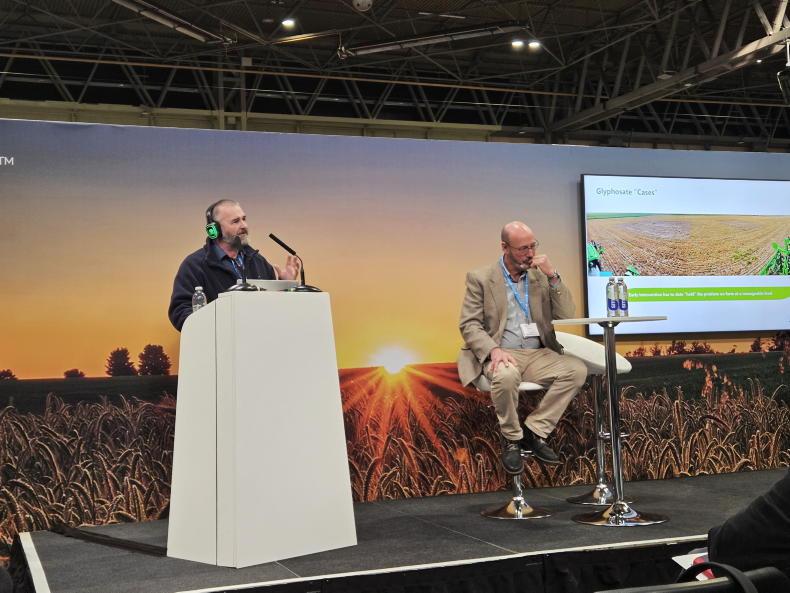
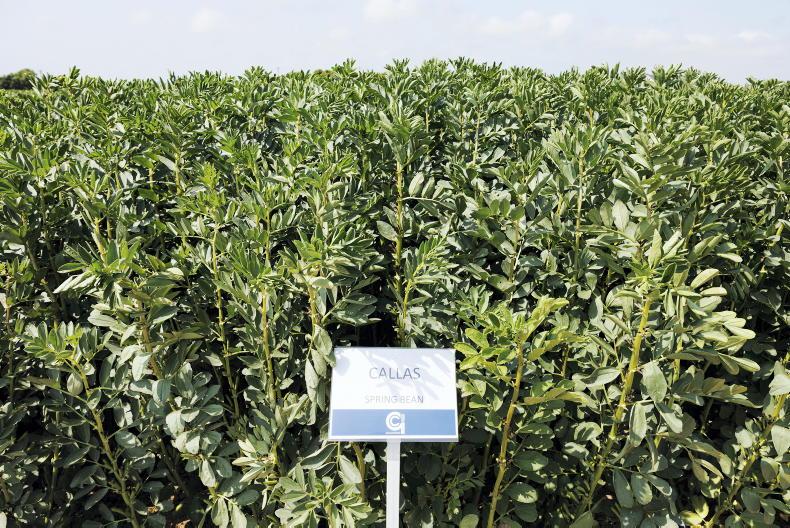
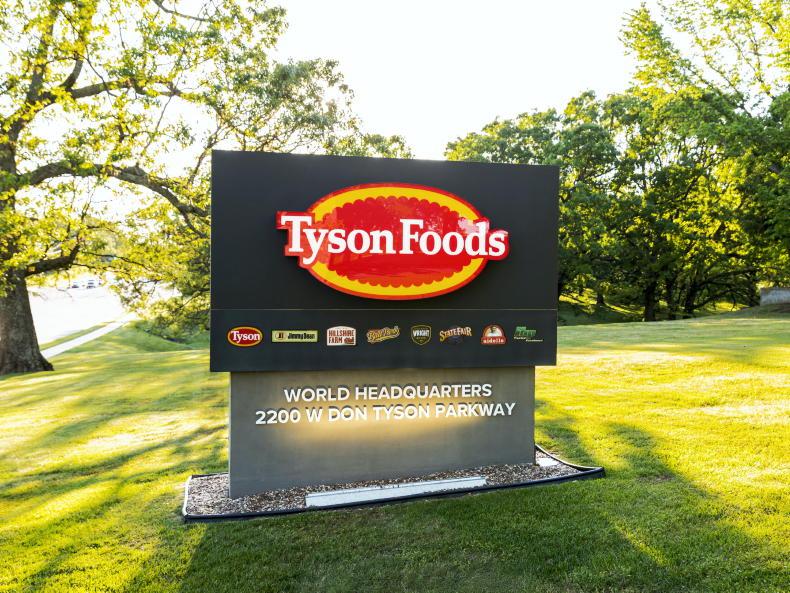
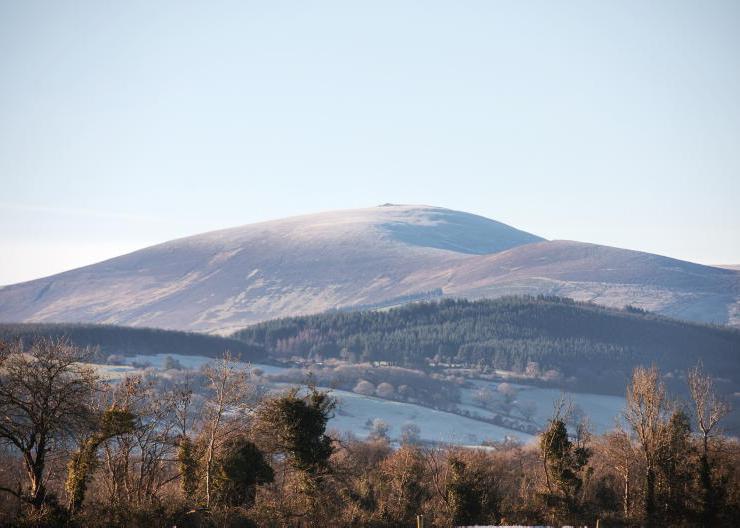
SHARING OPTIONS